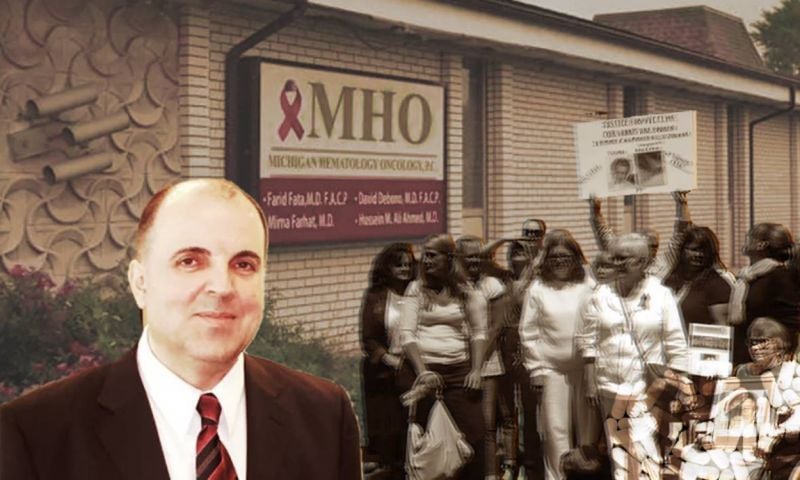
Farid Fata. (Illustration credit: Guilhem Dorandeu)
In 1992, Farid Fata took the Hippocratic oath before the Lebanese Medical Association. The oncologist and hematologist pledged to uphold principles such as patient care, confidentiality, and the commitment to “do no harm.”
Fata’s journey diverged from the usual success stories of Lebanese expatriates who thrived overseas. He did indeed go down in history but, as Michigan federal prosecutor Barbara McQuade summed it up, the “biggest fraudster in the history” of the United States.
“In many ways, he’s worse than [Bernie Madoff, the financier behind the world’s largest Ponzi scheme, estimated at $65 billion],” McQuad said during Fata’s trial, “in that he damaged not only his victims’ bank accounts, but also their health.”
How did this respected Michigan doctor end up behind bars and sentenced to life imprisonment?
Fata was born into a Greek-Catholic family in 1965 in the village of Kfarshima, Baabda district.
In 1983, in the midst of the 1975-90 Civil War, he started his medical studies at Saint Joseph University (USJ), where he stayed for three years before continuing his training at the Lebanese University.
After graduating, Fata immigrated to the US to specialize in oncology. It was 1992.
From 1993 to 1996, he completed his residency at Brooklyn’s Maimonides Medical. He then joined the hematology-oncology residency program at the renowned Memorial Sloan Kettering Cancer Center in New York, where he stayed until 1999.
In 2000, Fata embarked on his career path as an attending physician at Geisinger Medical Center in Danville, Pennsylvania. He decided to open his own practice in Rochester Hills, Michigan, in 2003.
Medical empire, charitable foundation
Fata did not aspire to become just another doctor in the American heartland. He had grand ambitions. He set his sights on becoming a prominent figure in the battle against cancer, not only in Michigan but across the nation.
He swiftly established a reputation for himself. His charisma and selflessness endeared him to his patients. In the span of just eight years, he successfully established seven clinics under the name Michigan Hematology Oncology (MHO).
Fata’s expansion efforts were so remarkable that he proceeded to establish the Michigan Radiation Institute (MRI), specializing in radiotherapy, an in-house pharmacy known as Vital Pharmacare (Vital), and a diagnostic testing center named United Diagnostics.
On the face of it, this comprehensive approach to patient care might have seemed unproblematic, but the system put in place was designed to maximize profits. Through this morally dubious strategy, Fata rapidly accumulated substantial wealth. Alongside his wife, Samar, and their three children, he took up residence in a lavish $1.5 million mansion in Oakland Township.
This was only the beginning.
In an e-mail exchange with his financial advisor, dating from August 2010 and revealed by the FBI investigation that would later lead to his incarceration, Fata wrote that he “needed a favor.”
“My father has a great deal on a fully furnished chateau in Adma,” Fata reportedly wrote in the email. “Can you get in touch with him and take a look at the house? The price is $3 million. Let me know if you can see the house. What is the economic interest and real estate market in Adma? Is there any economic value in investing in such a house?”
To finance his latest project, Fata even inquired with his advisor whether it was feasible to secure the funds through his foundation, as stated in FBI documents cited by the US media. The documents do not reveal whether he ultimately acquired this property.
Fata established the Fata Foundation in the US in 2008, intending to offer donations to specific charitable entities. Four years later, in September 2012, he extended the foundation’s reach to Lebanon, establishing its main office in Ballouneh, Kesrouan.
Through his medical domain, Fata managed to build a strong reputation, bolstered by his philanthropic work. Over several years, he was consistently included on lists of top doctors in the region, as recognized by local publications, reinforcing his ability to draw patients and expand his caseload.
His clinics consistently brimmed with patients. Based on the US investigation and collected testimonies, Fata managed to accommodate as many as 50 to 60 patients per day through meticulously planned eight-minute appointments. Certain patients recounted enduring eight-hour waits before their consultation.
Lie after lie
Outward success obscured a more ominous truth.
Throughout his trial, which commenced in 2014, he admitted to succumbing to a “self-destructive” pursuit of authority and affluence, as reported by the American media.
In his pursuit of the high life, he deemed any means justified. He misled patients, prescribing chemotherapy when they merely needed observation. Others, whose conditions were in remission, he kept on chemotherapy.
Conversely, he deliberately under-prescribed specific treatments if it lowered his costs. He persistently administered treatments to terminal patients, despite the lack of any discernible benefit.
As his patient count grew, his avaricious scheme became increasingly entrenched.
“I knew it was medically useless,” he conceded during his hearing, adding that he was “terribly ashamed” of what he had done.
Insatiable greed drove him to administer more than 9,000 medically superfluous infusions or injections — all potentially harmful, even lethal — to no fewer than 553 patients between 2007 and 2013.
The sole reason for these actions, the investigation report revealed, was to amass personal wealth.
A medical expert quoted in the investigation stated that the average oncologist buys $1.5 million of drugs per year; MHO’s three doctors spent $45 million a year on medication.
To ward off suspicion, Fata deceived those around him by claiming that his treatments were part of a revolutionary “European” or “French” protocol.
After his arrest, he went so far as to falsify a medical document intended to substantiate the effectiveness of his unconventional use of one of the drugs in his arsenal.
His approach involved subjecting his patients to what he called “maintenance” chemotherapy sessions — designed to justify the administration of additional doses of medication.
To prevent his patients from seeking a second opinion on his diagnoses, Fata carefully guarded their medical records.
A house of cards collapses
By 2007, the doctor rubbed shoulders with his community’s Lebanese and American elites. He was known for his generosity to the Melkite church in Warren, not far from his residence, which served as a gathering place for his compatriots. His fall from grace was imminent.
That year, Maggie Dorsey, who had undergone seven months of chemotherapy, was shocked to learn that, contrary to Fata’s diagnosis, she did not have cancer at all.
She discovered the truth during her stay at hospital where she was admitted for the severe side effects she suffered from the chemotherapy. Two years later, she lodged a complaint against Fata. The case was settled out of court, without the physician admitting the slightest wrongdoing.
The damage was done. Dorsey suffered from severe osteoporosis and painful neuropathy.
“I’m on a lot of medication and, even with everything I take, it provides me with just enough relief that I don’t go insane or cry constantly,” she told the prosecutor during the 2014 trial.
Following this initial red flag, Fata had the opportunity to halt his deceitful and dangerous activities. He did not.
A seasoned nurse who’d received a job offer in 2010 spent a day observing procedures at one of his clinics. She observed practices that contradicted the standard protocols followed by oncologists.
The primary motive behind these practices was to extend the duration of patient treatment, she said, solely to administer higher doses of medication. When she raised her concerns with her superiors, they said there was no wrongdoing.
It wasn’t until three years later, in the summer of 2013, that Fata began to face scrutiny.
Monica Flagg, a patient he’d diagnosed with cancer who had just started her first round of chemotherapy, broke her leg while leaving the clinic.
She was admitted to the hospital for surgery. Coincidentally, Fata was on vacation in Lebanon at that time.
Taking charge of her follow-up care at the receiving hospital was Soe Maunglay, a young oncologist from MHO. During a routine review of the patient’s tests and records, he was astounded.
“Not only did she not have cancer,” the prosecutor’s report recounts, “Soe Maunglay advised her to ‘escape’ [Farid] Fata.”
This prompted Maunglay to delve into other MHO patient records, where he uncovered numerous instances of unethical conduct.
At the same time, MHO employee George Karadsheh started his own investigation.
He talked to Maunglay, who referred him to the specific cases he had seen. He presented his findings to the Detroit FBI office and filed a complaint against Fata in early August 2013.
Fata was arrested on Aug. 6 of that year. By then, he had already treated over 16,000 patients and was still treating another 1,700.
Two years later, July 10, 2015, he was convicted of deliberately making false diagnoses and prescribing unnecessary treatments, with the aim of enriching himself by defrauding American insurance companies.
He was convicted on 16 counts, including 13 for healthcare fraud. In the meantime, the American press reported that his wife, Samar, CFO of MHO, had fled the US for Lebanon with their three children. The scam was said to have cost insurance companies some $35 million.
For the “harm inflicted on his victims,” “entirely in his own interest,” prosecutor McQuade requested that Fata receive the maximum sentence of 175 years in prison, 25 years longer than the sentence handed down to Bernie Madoff.
In the end, Fata received a prison sentence of 45 years, with the provision that he provide $17.6 million in restitution to his former patients and their families. This sum was subsequently adjusted to nearly $26.5 million.
All Fata’s numerous judicial appeals have so far been denied. The most recent request, dated Feb. 23, 2021, remains unanswered. Fata will not be eligible for release until the year 2050, at which point he will be 85 years old. He could potentially face additional legal complaints at that juncture.
This story originally ran in French in L’Orient-Le Jour, translated by Sahar Ghoussoub.
